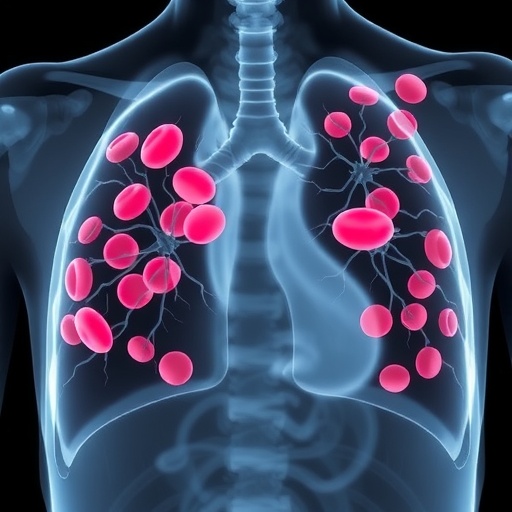Researchers have recently shed light on the intricate molecular mechanisms underlying chronic thromboembolic pulmonary hypertension (CTEPH), a serious condition characterized by high blood pressure in the lungs due to blood clots. The innovative work by Sun, Li, Li, and colleagues has unveiled a significant relationship between platelet dysfunction and the pathogenesis of CTEPH, utilizing advanced proteomic techniques to gain critical insights into this complex disorder. Their findings not only enhance our understanding of the disease but also hold potential implications for the development of new therapeutic strategies.
Chronic thromboembolic pulmonary hypertension is often a consequence of unresolved pulmonary emboli, where blood clots fail to break down adequately. This condition can lead to detrimental changes in the cardiovascular system, impeding blood flow and causing a broad range of symptoms, including breathlessness and fatigue. What this new research highlights is how alterations in platelet function may contribute to the disease’s progression. The involvement of platelets in acute thromboembolic events is well-recognized; however, their role in chronic states has been less understood. This research aims to bridge this gap by providing an in-depth analysis of platelet proteomics.
Proteomics, the large-scale study of proteins and their functions, has emerged as a powerful tool in understanding the biochemical landscape of various diseases. In this study, the researchers employed high-throughput proteomic techniques to analyze the protein expressions in platelets from patients diagnosed with CTEPH compared to healthy controls. This rigorous analysis allowed them to identify distinct protein profiles that correlate with platelet activation and dysregulation in the context of pulmonary hypertension.
The researchers discovered that certain proteins associated with inflammatory responses and clotting processes were significantly upregulated in CTEPH patients. These alterations in protein expression point toward a chronic state of platelet activation, suggesting that platelets may play an ongoing role in promoting inflammation and contributing to vascular remodeling in the lungs. The insights gained from these findings underscore a potential mechanism where platelets transition from merely serving as clotting elements to active participants in inflammatory pathways.
One particularly intriguing aspect of the study is the identification of specific signaling pathways that may be dysregulated in CTEPH. The mapped alterations in protein interactions suggest a network of signaling cascades involved in platelet activation that could lead to vascular injury over time. Understanding these molecular interactions presents an opportunity to target these pathways pharmacologically, potentially mitigating their contribution to disease progression.
Moreover, the research emphasizes the need for a paradigm shift in how chronic thromboembolic pulmonary hypertension is understood. Instead of viewing this condition solely as a consequence of thrombus formation, the findings advocate for recognizing the role of persistent platelet activation as a potential driver of pathophysiology. This could pave the way for new treatment modalities focusing on platelet regulation, which have not been traditionally prioritized in managing CTEPH.
The implications of these findings extend beyond physical health; they embody a shift in how medical professionals might approach treatment strategies for patients afflicted by CTEPH. The therapeutic potential of targeting platelet dysregulation could revolutionize existing management protocols, improving patient care and quality of life. It opens avenues for research into new medications specifically aimed at counteracting the dysfunctional behavior of platelets in this patient population.
Patients diagnosed with CTEPH often face significant challenges in their treatment journey, including limited therapeutic options with varying degrees of efficacy. The findings from this research underscore hope for innovative approaches that could work in tandem with existing therapies to provide a more comprehensive treatment solution. By understanding and intervening in the underlying molecular pathways driven by platelet dysregulation, it may be possible to enhance current treatment regimens significantly.
In addition to therapeutic advancements, these insights into the underlying mechanisms of CTEPH also highlight the interconnected nature of various bodily systems. The relationship between hemostasis and chronic inflammation emphasizes the necessity of a multidisciplinary approach in managing complex diseases where multiple pathways interact. Clinicians and researchers must collaborate closely to develop strategies that offer a holistic view of patient health.
As studies like this one continue to unveil the complexities of conditions such as CTEPH, the research community is reinforced in its resolve to tackle these challenges head-on. The urgency for advancing knowledge in this field must be met with equally robust efforts to bring findings to the clinic, ensuring that patients benefit from the latest scientific advancements. This research serves as a springboard for future investigations focused on translating basic scientific findings into clinical applications.
In conclusion, the work of Sun, Li, Li, and their team marks a pivotal step forward in understanding chronic thromboembolic pulmonary hypertension via a proteomic lens. Their findings elucidate the role of platelet dysregulation in disease pathogenesis, suggesting novel therapeutic approaches that could significantly alter the treatment landscape for affected patients. This research not only enhances our understanding of CTEPH but also exemplifies the power of state-of-the-art methodologies in uncovering the intricacies of human disease. The future looks promising as the implications of these findings could extend well beyond pulmonary hypertension, influencing a range of conditions where platelet function plays a crucial role.
Subject of Research: Chronic thromboembolic pulmonary hypertension and its relationship with platelet dysregulation.
Article Title: Proteomic insights into platelet dysregulation and pathogenic mechanisms of chronic thromboembolic pulmonary hypertension.
Article References:
Sun, L., Li, H., Li, Y. et al. Proteomic insights into platelet dysregulation and pathogenic mechanisms of chronic thromboembolic pulmonary hypertension.
J Transl Med 23, 1074 (2025). https://doi.org/10.1186/s12967-025-06891-8
Image Credits: AI Generated
DOI: 10.1186/s12967-025-06891-8
Keywords: Chronic thromboembolic pulmonary hypertension, platelet dysregulation, proteomics, inflammation, therapeutic strategies.




